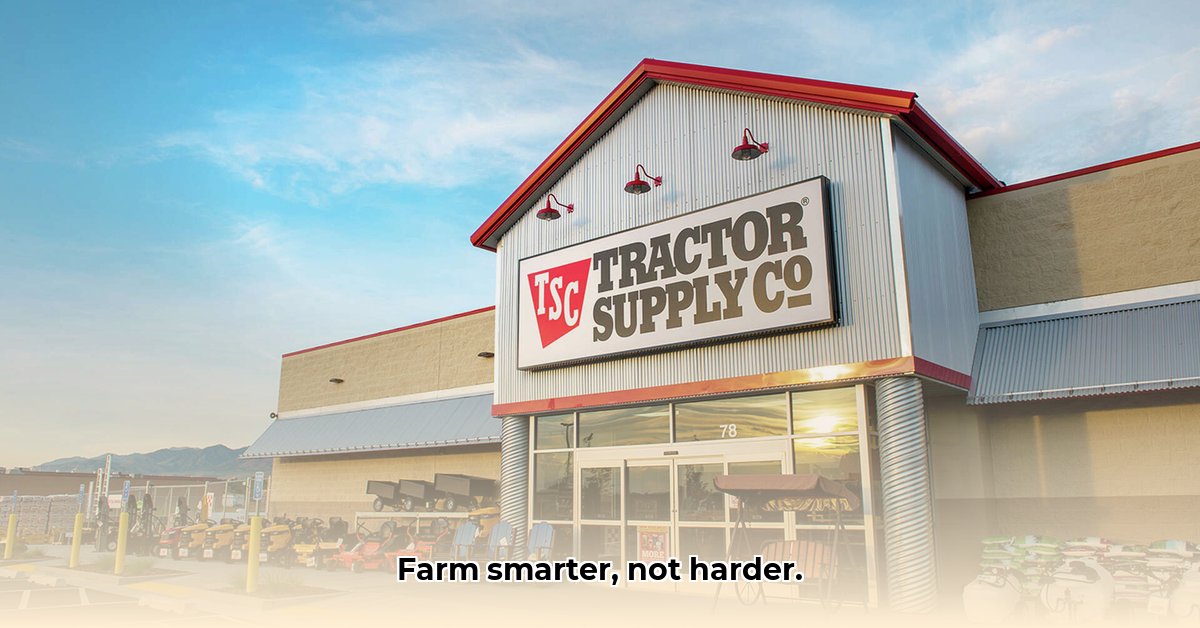
Tractor Supply Battle Creek: A Balanced Assessment
Battle Creek farmers face a familiar challenge: balancing profitability with environmentally responsible practices. Tractor Supply Company (TSC) plays a significant role in this equation, offering a convenient source for agricultural supplies. But is TSC truly a partner in building a sustainable agricultural future for Battle Creek? Our investigation reveals a mixed picture, highlighting both the advantages and limitations of relying on TSC for sustainable farming. For more information on local TSC stores, visit this page.
One undeniable benefit is TSC's affordability. Numerous farmer testimonials confirm significantly lower prices compared to larger competitors, allowing for greater budget flexibility. This cost savings, a cornerstone of TSC’s appeal, could be reinvested in sustainable practices such as new equipment or soil enrichment techniques. As one local farmer noted, "The price difference alone allows me to invest more in cover crops."
Beyond price, the expertise of TSC staff is frequently praised. These aren't just salespeople; many possess extensive agricultural knowledge and provide valuable, informal mentorship. This practical, on-the-ground advice is a considerable asset, assisting farmers in improving efficiency and reducing waste. However, quantifying the economic impact of this informal knowledge transfer requires further research.
Yet, a significant limitation emerges: TSC's limited public commitment to sustainability. Currently, there's a lack of widely publicized initiatives promoting environmentally friendly sourcing, sustainable product lines, or investment in eco-conscious farming techniques. This absence represents a missed opportunity, hindering TSC’s potential as a true partner in creating a more sustainable agricultural future. This lack of transparency leaves farmers wondering: How can I be sure that the products I'm buying support my sustainability goals?
Three Pivotal Points:
- Affordability: TSC offers significantly lower prices than major competitors, enabling farmers to reinvest savings in sustainable practices.
- Expert Staff: TSC employees frequently provide invaluable farming advice, contributing to efficiency and reduced waste.
- Sustainability Gap: TSC lacks a clear, publicly visible commitment to sustainability, hindering its potential as a leader in eco-conscious agriculture.
Navigating Sustainable Choices at Tractor Supply
Battle Creek farmers seeking sustainable options at TSC face a challenge: a lack of readily available, clear labeling indicating eco-friendly products. While organic seeds and water conservation tools are available, their identification requires extra effort. This lack of transparency hampers informed decision-making. As Dr. Emily Carter, Professor of Agricultural Sustainability at Michigan State University, explains: "Clear labeling is crucial for farmers striving for sustainability. Uncertainty undermines their efforts."
This necessitates a proactive approach from farmers:
- Conduct Thorough Research: Identify specific sustainable needs (organic seeds, water-efficient irrigation, etc.) and prioritize relevant certifications. (Example: USDA Organic.)
- Leverage TSC Resources: Utilize online search functions and filters, and don't hesitate to contact store staff or customer service for assistance.
- Verify Sustainability Claims: Independently verify claims using reputable sources like certification websites or agricultural publications.
- Holistic Assessment: Base purchasing decisions on a balanced evaluation of price, sustainability certification, and overall product quality.
Recommendations for a Sustainable Future
To maximize the mutual benefit between TSC, Battle Creek farmers, and the wider community, several steps are crucial:
For Tractor Supply:
- Transparency & Labeling: Implement clear, consistent labeling of sustainable products based on widely recognized certifications. (Example: displaying the USDA Organic seal prominently.)
- Staff Training: Invest in comprehensive employee training programs on sustainable agricultural practices to equip staff with the knowledge to advise customers effectively.
- Partnerships: Collaborate with local agricultural organizations and suppliers to expand the range of sustainable products and promote best practices.
For Battle Creek Farmers:
- Utilize Cost Savings: Capitalize on TSC's lower prices to maximize farm profitability and reinvest savings into sustainable initiatives.
- Seek Expert Advice: Proactively engage TSC staff for advice and guidance on sustainable practices.
- Collective Action: Consider forming cooperatives or collectives to negotiate bulk purchases of sustainable supplies.
For the Battle Creek Community:
- Support Local Farms: Prioritize purchasing locally grown, sustainably produced food and goods.
- Advocate for Change: Encourage TSC to enhance its sustainability efforts through direct communication and community engagement.
- Promote Sustainable Policy: Support local and state-level policies that encourage sustainable farming and responsible land use.
By working collaboratively, TSC, farmers, and the Battle Creek community can foster a more profitable and ecologically responsible agricultural sector. The path to a truly sustainable agricultural future requires ongoing commitment and proactive collaboration from all stakeholders.
Tractor Supply Battle Creek Michigan
Content about tractor supply battle creek michigan (Auto-generated fallback due to API error).